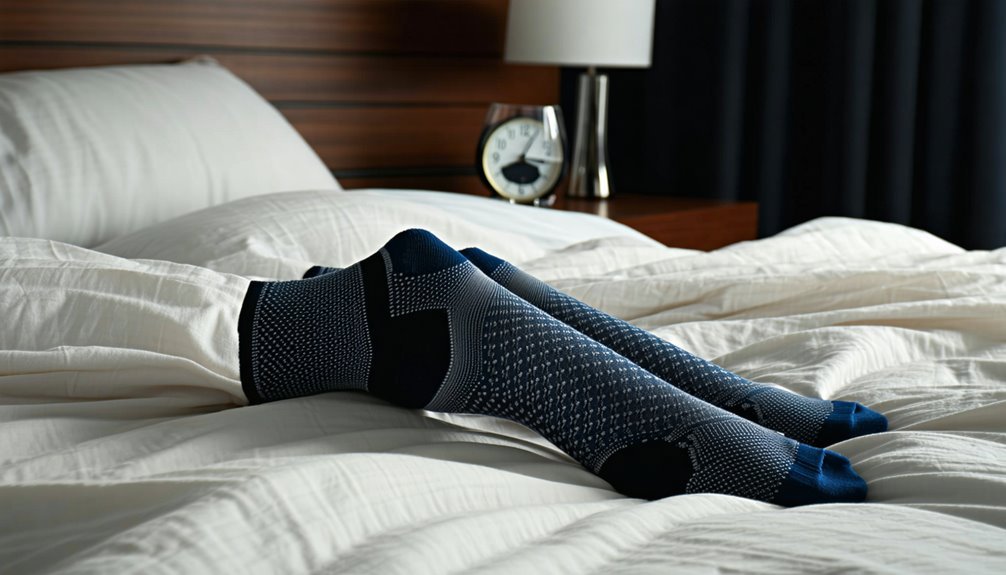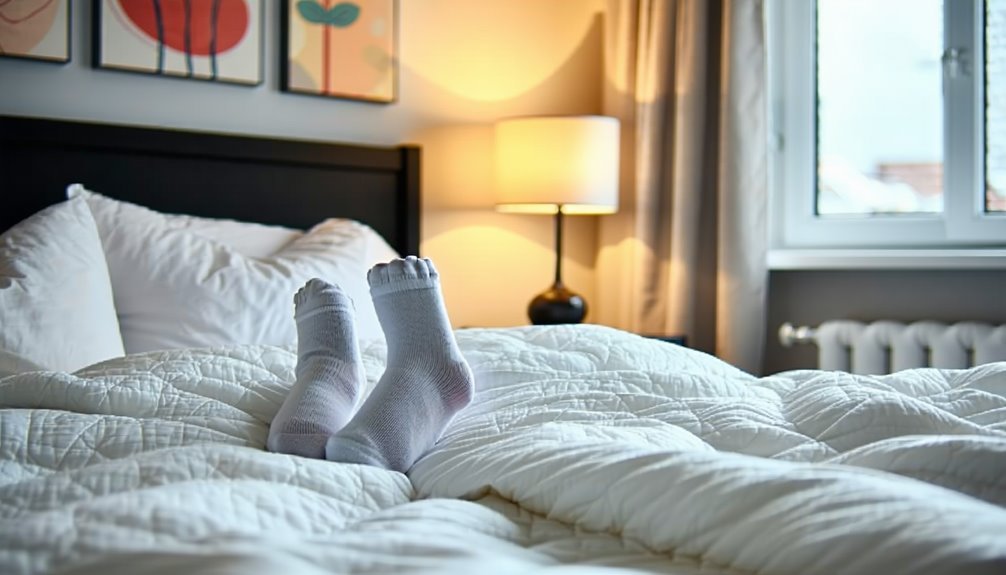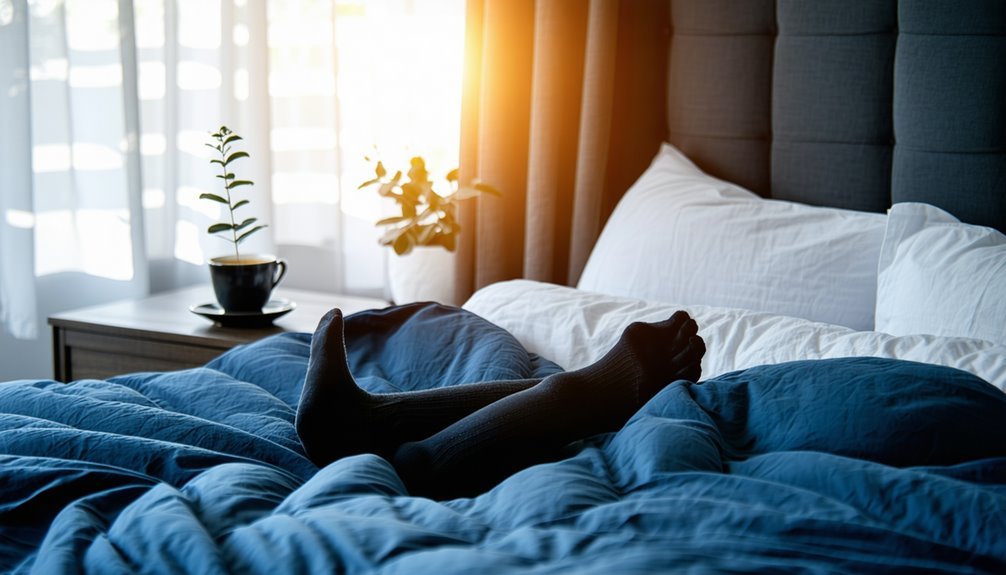Can You Wear Compression Socks to Sleep?
Wearing compression socks to sleep can enhance circulation and reduce swelling, but it's crucial to consult your healthcare provider first. Poorly fitted or excessively tight socks might disrupt sleep, cause skin irritation, or exacerbate existing circulatory issues. If you have conditions like peripheral artery disease or congestive heart failure, avoid overnight use. Consider your medical history and any signs of discomfort. With proper guidance, explore ways to integrate compression socks into your sleep routine effectively.
Understanding Compression Socks and Their Purpose

Although you might be familiar with the concept of compression socks, understanding their purpose can enhance your appreciation of their benefits. Compression socks apply graduated pressure to your legs, aiding venous return and reducing the risk of deep vein thrombosis. Different types of compression are available, including mild, moderate, and firm. These levels cater to specific medical conditions and patient needs, guaranteeing optimal support and safety.
The sock materials play an essential role in their effectiveness. Typically, they're crafted from a blend of nylon, spandex, and polyester, providing elasticity and durability. This combination guarantees a snug fit, promoting consistent pressure distribution. When selecting compression socks, consider both the type of compression and material composition to guarantee they meet your clinical requirements and safety concerns.
Benefits of Wearing Compression Socks Overnight
Wearing compression socks overnight can greatly enhance your blood circulation, which is essential for preventing venous insufficiencies. You'll also experience a reduction in swelling, particularly in your lower extremities, by promoting ideal lymphatic drainage. By incorporating this simple intervention into your nightly routine, you may improve your overall vascular health and reduce discomfort associated with edema.
Enhanced Blood Circulation
Many individuals find that wearing compression socks overnight can greatly enhance blood circulation, providing numerous health benefits. When you wear these specialized socks, they apply gentle pressure to your legs, promoting peak blood flow and aiding circulation improvement. This can be particularly beneficial for those who spend long periods in sedentary positions or have circulatory disorders.
Here's how compression socks can enhance blood circulation overnight:
- Venous Return: They support the veins, encouraging blood to return to the heart more efficiently.
- Reduced Venous Pressure: By decreasing pressure in the veins, they help prevent blood pooling.
- Improved Oxygen Delivery: Enhanced circulation ensures that tissues receive adequate oxygen, promoting overall well-being.
- Prevention of Stasis: Prevents blood from stagnating, reducing the risk of complications.
Wearing compression socks safely supports your circulatory health.
Swelling Reduction Benefits
In addition to enhancing blood circulation, compression socks provide significant benefits in reducing swelling, especially when worn overnight. As you sleep, your body's metabolic processes slow, which can sometimes lead to fluid accumulation in your lower extremities. Wearing compression socks at night can offer swelling relief by applying gentle, graduated pressure to your legs, promoting lymphatic drainage and venous return. This can be particularly beneficial if you suffer from conditions like chronic venous insufficiency or lymphedema.
Potential Risks and Drawbacks to Consider
Although compression socks offer benefits, it's important to be aware of potential risks and drawbacks when considering their use during sleep. Here are some concerns:
- Discomfort Levels: Wearing compression socks overnight may elevate discomfort levels, especially if the socks are too tight or improperly fitted.
- Skin Irritation: Extended wear can lead to skin irritation or rashes, particularly in individuals with sensitive skin or allergies to materials used in the socks.
- Circulatory Complications: Improper use may exacerbate circulatory issues, potentially causing more harm than good, especially if underlying health conditions exist.
- Pressure Points: Prolonged compression might create pressure points, leading to numbness or tingling sensations in your legs.
Always consult with a healthcare professional to guarantee safe and effective use of compression socks while sleeping.
Expert Opinions on Sleeping With Compression Socks
When considering wearing compression socks during sleep, you'll want to weigh both the potential health benefits and associated risks. Medical experts often highlight the importance of evaluating individual conditions, like venous insufficiency, before making a decision. It's advised to consult your healthcare provider to guarantee that wearing compression socks overnight aligns with your health needs and doesn't compromise circulation.
Potential Health Benefits
While it's common to associate compression socks with daytime use, wearing them while sleeping could offer specific health benefits, according to some experts. You might experience improvements in various health conditions by selecting the appropriate sock types. Here are some potential benefits:
- Enhanced Circulation: By maintaining gentle pressure on your legs, these socks can improve venous blood flow during sleep, reducing the risk of blood pooling or clot formation.
- Reduced Swelling: They may help decrease edema by facilitating fluid movement, particularly beneficial for those with chronic venous insufficiency.
- Leg Comfort: Compression socks can provide relief from discomfort or heaviness, ensuring a more restful night's sleep.
- Preventative Care: For those at risk of deep vein thrombosis, wearing compression socks overnight might serve as a proactive measure.
Risks and Considerations
Despite the potential benefits, wearing compression socks while sleeping is not without risks and requires careful consideration. One essential factor is selecting appropriate compression levels. Excessive compression may impede circulation rather than enhance it, potentially leading to discomfort or skin irritation. It's vital to guarantee the socks fit properly, as an improper fit could exacerbate these issues.
Moreover, sleep quality might be affected if the socks are too tight, causing restlessness or discomfort during the night. You should be vigilant for signs like numbness, tingling, or pain, which indicate that the socks might be too restrictive. Before deciding to sleep with compression socks, evaluate your individual health needs and consider consulting a healthcare provider to verify safety and efficacy in their use.
Medical Expert Recommendations
Many medical experts agree that wearing compression socks while sleeping can be beneficial for certain individuals, but it's not universally recommended. If you're considering this option, it's essential to consult with a healthcare provider to verify it's suitable for your specific condition. Here are some expert recommendations:
- Compression Sock Types: Choose the appropriate compression level (measured in mmHg) based on your medical needs.
- Optimal Fit: Confirm the socks fit well, avoiding overly tight or loose options that may compromise efficacy or safety.
- Medical Conditions: Consult your physician if you have conditions like venous insufficiency or lymphedema, where night use may be advantageous.
- Trial Period: Start with short durations to assess comfort and any adverse effects.
Prioritize your safety and well-being by following these guidelines.
Who Should Avoid Wearing Compression Socks to Bed?

Even though compression socks offer numerous benefits, they're not suitable for everyone to wear overnight. If you have certain health conditions, such as peripheral artery disease, it's essential to consult your healthcare provider before sleeping in them. The pressure exerted by these socks may compromise blood flow, exacerbating existing conditions. Additionally, individuals with skin sensitivities might experience irritation or discomfort, impacting their individual comfort and sleep quality.
It's also advisable to avoid wearing compression socks to bed if you have congestive heart failure, as they can affect circulation dynamics. Ensuring your safety and comfort is paramount. Always consider your unique medical history and consult with a medical professional to determine what's best for you. Your health and well-being should always take precedence over convenience.
Tips for Safely Wearing Compression Socks While Sleeping
When contemplating the use of compression socks during sleep, it's vital to adopt certain strategies to guarantee their safe application. Prioritize your well-being with these considerations:
- Evaluate Sleeping Positions: Verify your chosen sleeping position doesn't constrict blood flow. Elevating your legs slightly can enhance circulation.
- Select Appropriate Sock Materials: Opt for breathable, hypoallergenic materials to prevent skin irritation and maintain comfort throughout the night.
- Monitor Fit and Pressure: Confirm the socks fit snugly but aren't overly tight. Excessive compression could compromise circulation and cause discomfort.
- Consult with a Healthcare Professional: Before incorporating compression socks into your sleep routine, seek medical advice to tailor recommendations to your specific health needs.
Making an Informed Decision for Your Health
Understanding the safe use of compression socks during sleep sets the stage for making an informed decision about your health. When considering these garments, it's vital to evaluate both potential benefits and risks. Compression socks can enhance circulation improvement, particularly beneficial if you experience venous insufficiency. However, wearing them overnight might not be suitable for everyone, especially if you have certain medical conditions. Prioritizing sleep quality is important; discomfort or improper fit can disrupt rest.
Consult your healthcare provider to assess if wearing compression socks while sleeping aligns with your specific health needs. They can provide guidance that considers your medical history and current health status. This guarantees that your approach to enhancing circulation doesn't inadvertently compromise your sleep quality or overall well-being.
Frequently Asked Questions
Do Compression Socks Come in Different Styles or Colors?
Did you know that 80% of patients prefer personalized medical wear? Compression sock styles and colors cater to your needs, offering diverse options that guarantee both therapeutic benefits and personal comfort. Prioritize safety by choosing suitable designs and hues.
How Do I Choose the Right Size Compression Socks?
To guarantee ideal compression sock fit, first measure the circumference of your ankle, calf, and sometimes thigh. Adhere to the manufacturer's compression sock measurements chart for precise sizing. Proper fit guarantees efficacy and minimizes potential risks.
Can Children Wear Compression Socks to Sleep?
Imagine a child with venous insufficiency seeking relief. You'd guarantee their safety first. While compression socks can support children's health, consult a pediatrician to guarantee no adverse effects on circulation or sleep benefits.
Are There Any Brands Recommended for Overnight Use?
You're considering overnight effectiveness, so focus on reputable brands like Sigvaris or Medi. These brands offer clinical-grade compression socks designed for safe, prolonged wear. Always consult with your healthcare provider for personalized brand comparisons and recommendations.
How Do I Wash and Care for Compression Socks?
Think of your compression socks as a shield in need of care. Use gentle washing techniques—hand wash with mild detergent, air dry—to guarantee sock longevity. This safeguards their therapeutic benefits, maintaining your vascular health and promoting patient safety.







